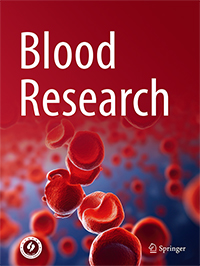Korean J Hematol 1997; 32(2):
Published online June 30, 1997
© The Korean Society of Hematology
마우스 대식세포에서 Antithrombin Ⅲ에 의한 Nitric Oxide 생성
곽재용, 박상열, 이혜수, 손명희, 임창열
전북대학교 의과대학 내과학교실,
전북대학교 수의과대학 수의학교실,
전북대학교 의과대학 임상병리학교실,
전북대학교 의과대학 핵의학교실
Nitric Oxide Synthesis in Murine Peritoneal Macrophages by Antithrombin Ⅲ
Background: During the development of inflammatory responses, various cytokines including interferon-γ(IFN-γ), tumor necrosis factor-α(TNF), interleukin-1(IL-1)
which activate macrophages to synthesize nitric oxide(NO) and hemostatic cascades are secreted. However, effects of various factors involved in hemostasis on NO synthesis
have been little known. In this report, we studied the effects of antithrombin Ⅲ(AT-Ⅲ) on NO synthesis by thioglycollate-elicited peritoneal macrophages of BALB/c mouse.
Methods: Macrophages were obtained from BALB/c mice injected with 3% thioglycollate and cultured with or without various reagents. Nitrite concentration was
measured using a modification of Griess reaction. Immunoblot analysis for inducible nitric oxide synthase(iNOS), AT-Ⅲ receptor binding study and assay of TNF secretion were performed.
Results: AT-Ⅲ alone did not induce nitrite synthesis by macrophages. However, AT-Ⅲ induced nitrite synthesis in the presence of IFN-γ in a dose dependant manner.
iNOS was also expressed in macrophages by the treatment with IFN-γ/AT-Ⅲ. Addition of 0.5mM NG-monomethyl-L-arginine markedly inhibited IFN-γ/AT-Ⅲ-induced nirtite synthesis. Treatment with 5㎍/mL polymyxin B, which inactivates LPS, did not inhibit IFN-γ/AT-Ⅲ-induced nitrite synthesis, excluding inadvertent endotoxin contamination. Addition of rabbit anti-human AT-Ⅲ polyclonal IgG antibodies, but not control rabbit IgG, inhibited IFN-γ/AT-Ⅲ-induced nitrite production. Treatment of macrophages with heparin did not augment, but inhibited both IFN-γ/AT-Ⅲ- and IFN-γ/LPS-induced nitrite synthesis.
Conclusion: Our results indicated that AT-Ⅲ acted as a modulator of macrophage activation for L-arginine dependent NO synthesis and that AT-Ⅲ might be an
important molecule in the regulation of immune responses by macrophage activation to induce NO synthesis as well as in the regulation of hemostasis. Heparin was not a
cofactor in the AT-Ⅲ-induced NO synthesis.
Keywords Antithrombin Ⅲ; Nitric oxide; Macrophage; Heparin;
Article
Korean J Hematol 1997; 32(2): 234-247
Published online June 30, 1997
Copyright © The Korean Society of Hematology.
마우스 대식세포에서 Antithrombin Ⅲ에 의한 Nitric Oxide 생성
곽재용, 박상열, 이혜수, 손명희, 임창열
전북대학교 의과대학 내과학교실,
전북대학교 수의과대학 수의학교실,
전북대학교 의과대학 임상병리학교실,
전북대학교 의과대학 핵의학교실
Nitric Oxide Synthesis in Murine Peritoneal Macrophages by Antithrombin Ⅲ
Jae Yong Kwak, Sang Youel Park, Hae Su Lee, Myung Hee Sohn, Chang Yeol Yim
Department of Internal Medicine, Clinical Pathology, Nuclear Medicine, Chonbuk National University Medical School and veterinary Medicine Chonbuk National University veterinary School, Chonju, Korea
Department of Nuclear Medicine, Chonbuk National University Medical School
Department of Veterinary Medicine, Chonbuk National National University Veterinary School, Chonju, Korea
Abstract
Background: During the development of inflammatory responses, various cytokines including interferon-γ(IFN-γ), tumor necrosis factor-α(TNF), interleukin-1(IL-1)
which activate macrophages to synthesize nitric oxide(NO) and hemostatic cascades are secreted. However, effects of various factors involved in hemostasis on NO synthesis
have been little known. In this report, we studied the effects of antithrombin Ⅲ(AT-Ⅲ) on NO synthesis by thioglycollate-elicited peritoneal macrophages of BALB/c mouse.
Methods: Macrophages were obtained from BALB/c mice injected with 3% thioglycollate and cultured with or without various reagents. Nitrite concentration was
measured using a modification of Griess reaction. Immunoblot analysis for inducible nitric oxide synthase(iNOS), AT-Ⅲ receptor binding study and assay of TNF secretion were performed.
Results: AT-Ⅲ alone did not induce nitrite synthesis by macrophages. However, AT-Ⅲ induced nitrite synthesis in the presence of IFN-γ in a dose dependant manner.
iNOS was also expressed in macrophages by the treatment with IFN-γ/AT-Ⅲ. Addition of 0.5mM NG-monomethyl-L-arginine markedly inhibited IFN-γ/AT-Ⅲ-induced nirtite synthesis. Treatment with 5㎍/mL polymyxin B, which inactivates LPS, did not inhibit IFN-γ/AT-Ⅲ-induced nitrite synthesis, excluding inadvertent endotoxin contamination. Addition of rabbit anti-human AT-Ⅲ polyclonal IgG antibodies, but not control rabbit IgG, inhibited IFN-γ/AT-Ⅲ-induced nitrite production. Treatment of macrophages with heparin did not augment, but inhibited both IFN-γ/AT-Ⅲ- and IFN-γ/LPS-induced nitrite synthesis.
Conclusion: Our results indicated that AT-Ⅲ acted as a modulator of macrophage activation for L-arginine dependent NO synthesis and that AT-Ⅲ might be an
important molecule in the regulation of immune responses by macrophage activation to induce NO synthesis as well as in the regulation of hemostasis. Heparin was not a
cofactor in the AT-Ⅲ-induced NO synthesis.
Keywords: Antithrombin Ⅲ, Nitric oxide, Macrophage, Heparin,





 PDF
PDF Standard view
Standard view Export citation
Export citation Share
Share  Previous Article
Previous Article



